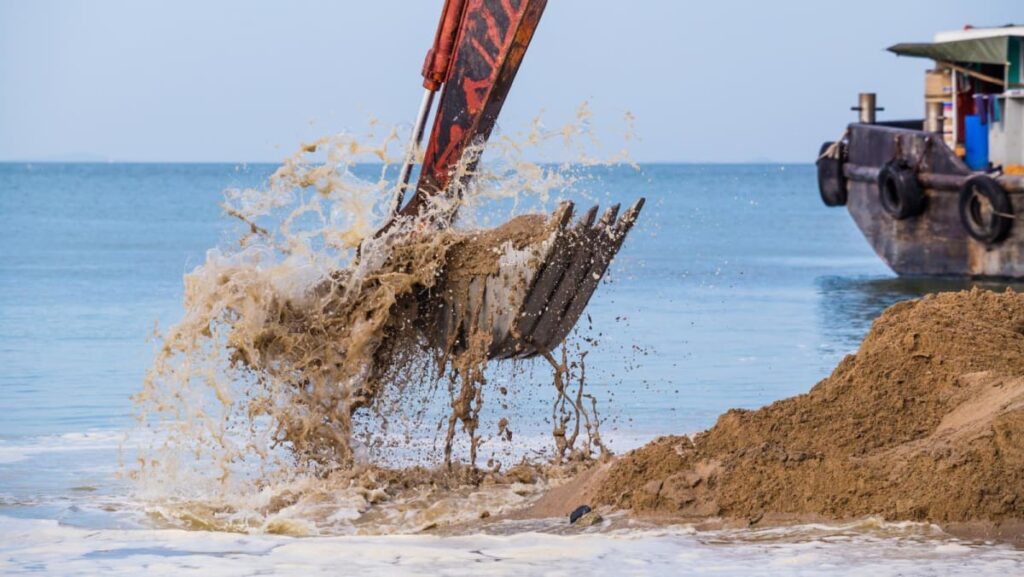JAKARTA: A move by the Indonesian government to effectively lift a ban on the export of sand has sparked an outcry by environmental activists and some politicians.
They claimed that the move exploits the environment and brings about negative social impacts.
In response, President Joko Widodo said that what is being exported is not sea sand.
“This is not sea sand. What is allowed (to be exported) is sedimentation,” Mr Widodo was quoted as saying by Detik on Tuesday (Sep 17).
The export ban – which has been in place for over 20 years – was lifted on Sep 9 after Trade Minister Zulkifli Hasan revised it. In a media release, his ministry had identified sea sand as one of the forms of sedimentation.
This comes more than a year after Mr Widodo in May last year issued a regulation that allowed for mining permit holders to collect and export sea sand, provided that domestic needs have been met.
That announcement had similarly met some opposition from environmental groups.
This presidential regulation can only be implemented after the Ministry of Trade has revised the law on the prohibition of sea sand exports – which occurred last week – and will come into force after 30 working days.
Local media reported the government as saying that the new regulation was issued to tackle sedimentation of deposits that are in the form of sand and mud that can disrupt marine ecosystems and shipping lanes.
But activists and some politicians are still not convinced, echoing similar criticisms from when Mr Widodo had first made the announcement last year.
The Greenpeace organisation said that the reopening of sea sand exports added to the “ecological sins” of Mr Widodo’s administration at the end of his term. Mr Widodo is set to step down from the country’s top office next month.
Mr Afdillah Chudiel, Greenpeace Indonesia’s marine campaigner, said that his organisation had anticipated the reauthorisation of the sea sand exports following Mr Widodo’s announcement last year.
“There have been many criticisms by the community, fishermen, academics and researchers. We have predicted from the beginning that the Jokowi regime will not care about criticism and will not side with the environment,” Mr Afdillah said as quoted from Greenpeace’s official website.
Greenpeace said that sea sand mining can damage marine ecosystems, destroy biodiversity habitats, and exacerbate coastal abrasion and tidal flooding.
In addition, environmental damage caused by sand mining can damage the economy of fishermen who depend on the availability of fish in the sea.
“Sand mining can damage fishermen’s fishing areas, reduce productivity, and in the long run can cause food insecurity,” Mr Afdillah said.
In 2003, then-President Megawati Soekarnoputri issued a ban on the export of sea sand as it was considered damaging to the environment and had the potential to submerge small islands.
Before the ban in 2003, Indonesia was Singapore’s major supplier of sea sand for land reclamation.
Mr Widodo’s administration has since claimed that there will be no environmental damage in the export of sea sand this time because it will be imposed with strict conditions.
Among the main conditions, the sand extracted is only sedimentation found in seven Indonesian regions, spread across the islands of Java, Kalimantan and Riau Islands.
“Sediment is different, even though it is also sand. But it is sedimentation,” Mr Widodo said on Tuesday.
But the Greenpeace activist Mr Afdillah argued that sedimentation should only be in the form of mud that has no selling value, not sand that can be exported.
“This reason is only made up to find justification for mining sand and exporting it abroad,” he said.
https://www.channelnewsasia.com/asia/indonesia-sea-sand-export-criticism-joko-widodo-environment-4618331


